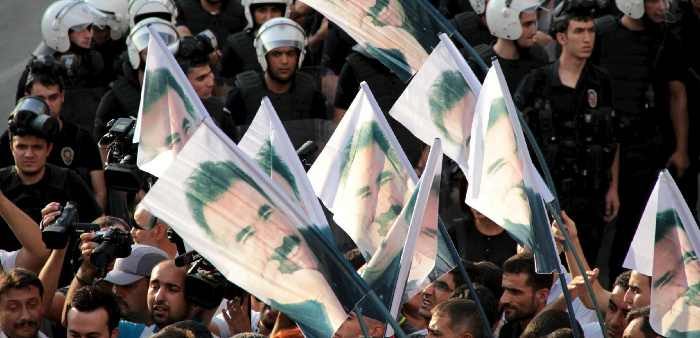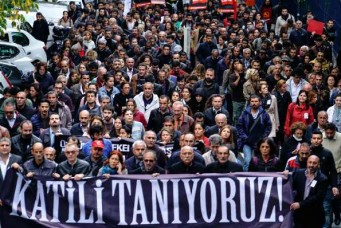Turkey’s Kurds Split by AKP Policies
President Erdogan’s scare tactics may have pushed the country further towards a conflict neither Kurdish rebels nor the Turkish army can win.

Demonstrators with pictures of imprisoned Kurdish leader Abdullah Ocalan, Diyarbakir, Turkey, Sept. 6, 2015. Sertac Kayar/Reuters/Corbis
In a stunning electoral comeback that has surprised everyone, including its own legislators, Turkey’s ruling Justice and Development Party (AKP) captured almost 50 percent of the votes in November’s parliamentary elections.
President Recep Tayyip Erdoğan called for early elections after his party lost its parliamentary majority in June’s parliamentary elections in an effort to return the AKP to the majority. In the months that followed, the country opened a two-front war against the extremist group Islamic State and Kurdish separatists. Erdoğan’s strategy of “controlled chaos” seems to have worked. Resuming the fight against the Kurdistan Workers Party (PKK) convinced the nationalist voters who were critical of the government’s peace deal with the PKK that the peace process with the Kurds was dead. Additionally, the renewal of conflict convinced the ruling party’s own supporters that the country would be facing further chaos and instability in the absence of an AKP majority.
The biggest surprise was the AKP’s winning back the conservative Kurdish votes that it lost to the pro-Kurdish Peoples’ Democratic Party (HDP). The government, particularly President Erdoğan, had alienated the conservative Kurds who have traditionally voted for the AKP when the government blocked aid to the Syrian Kurds fighting the Islamic State in Iraq and Syria (ISIS) in Kobane in 2014. Turkey’s Kurds took to the streets to demonstrate against what they saw as the government’s refusal to protect their kin next door.
In protest, conservative Kurds voted in large numbers for the pro-Kurdish HDP, handing it a historic 13 percent in June’s parliamentary elections. The resumption of violence, breakdown of ceasefire between the government and the PKK, imposition of curfews, and civilian deaths in Kurdish cities after June elections made many think that the AKP had lost the Kurds forever. November elections, however, proved them wrong. Although the AKP was only be able to recapture a small percentage of the conservative Kurdish votes, the party increased its votes in Kurdish cities and regained eighteen deputies from the pro-Kurdish HDP. In Diyarbakir, the unofficial capital of Turkey’s Kurds, the AKP won two of the eleven seats to be filled, doubling its June tally.
Several factors account for the shift in conservative Kurdish votes. After decades of conflict and thousands of deaths, the people of the Kurdish region want peace. The horrific years of the 1990s when extra judicial killings by the Turkish deep state, civilian deaths and disappearances were common are still fresh in their memories. They overwhelmingly supported the pro-Kurdish HDP in June elections to give a chance to what they saw as “the only actor that could deliver peace” to build on the ceasefire that was declared by the PKK’s imprisoned leader Abdullah Öcalan in 2013.
Two years of quiet, however, ended when the ceasefire broke down following the June elections. The PKK’s resumption of violence in retaliation to an ISIS attack in July that killed several dozen Kurdish and left-wing activists in the Kurdish town of Suruç and the government’s escalation of the fighting triggered a violent conflict between the state and the PKK in the city centers. The PKK’s youth wing dug trenches and erected barricades to prevent Turkish police vehicles from entering cities. Several Kurdish-run districts declared autonomy. In response, the Turkish government imposed curfews on several Kurdish cities, conducted mass arrests, including democratically elected HDP co-mayors, and launched a heavy-handed military campaign. The PKK’s carrying the clashes from the mountains to the city centers and the government’s heavy-handed military response disrupted daily life, forced business owners to close down their shops, and inflicted hundreds of civilian casualties.
The fear of going back to the traumatic years of the 1990s among Kurds peaked after June elections. The AKP has played on Kurdish fears of the old deep state. Speaking to a crowd in the Kurdish city of Van in October, Prime Minister Ahmet Davutoğlu invoked a powerful symbol of past violence: the automobiles used by a state-linked terrorist group in the 1990s to kidnap Kurds. Davutoğlu said, “If the AKP is toppled from power, these terrorist gangs” and their “white Renault cars will return.” The frustration with the PKK’s urban warfare and the disappointment with the HDP’s perceived inability to exert influence over the course of events coupled with this fear led many middle-class, urban conservative voters to return to the AKP fold in the hopes of restoring public order and stability.
Another factor contributing to the AKP’s stronger showing among conservative Kurds compared to the previous elections is the government’s electoral strategy in the Kurdish region. The campaign’s focus on public order, security, and development has appealed to the war-weary Kurdish middle class longing for an end to the conflict and initiatives to start working on the region’s war-torn infrastructure.
The lingering question on everyone’s mind is what’s next? The AKP recaptured its parliamentary majority. With Erdoğan at the helm, judiciary, media and the military under its control, the party is stronger than ever. Will this translate into renewed efforts to resolve the country’s long-lasting Kurdish question?
The government is not likely to back down on its military campaign against the PKK. The Kurdish group will not declare a unilateral ceasefire when Turkish jets are dropping bombs on PKK targets. But the two parties have fought long enough to know that neither side will win this war militarily. Fighting a multi-front war against ISIS in Syria and Iraq, the PKK’s forces are overstretched and cannot afford a long-term war against NATO’s second biggest army. Turkey, for its part, cannot keep fighting an urban war in the country’s southeast at a time when Turkish economy is teetering on the edge and a civil war being waged on its doorstep.
So somewhere down the road, the government has to resume the negotiations with the Kurds. When that happens, the real question will be how the government will balance the conflicting demands of its nationalist base and the new battle hardened Kurdish generation who will not settle down for cosmetic changes.
Gönül Tol is the founding director of The Middle East Institute’s Center for Turkish Studies. She is also an adjunct professor at George Washington University’s Institute for Middle East Studies and writes a weekly column for the liberal Turkish daily Radikal. On Twitter: @gonultol.



